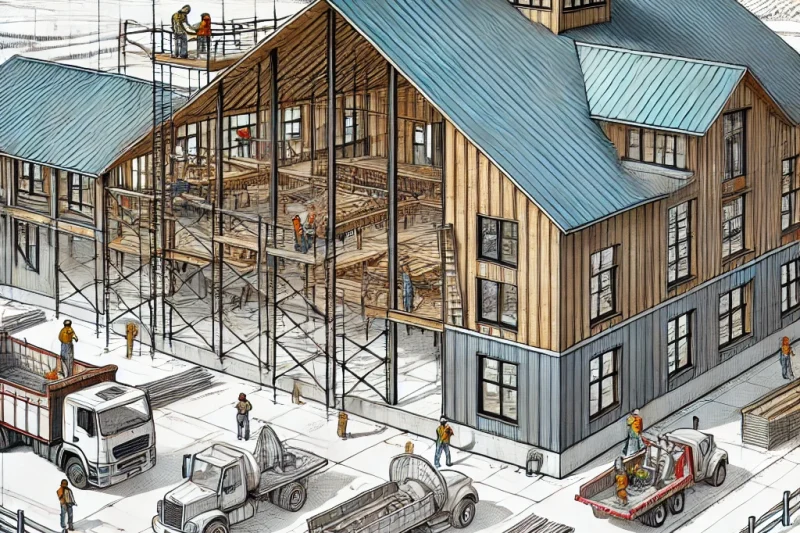USDA Eligibility Guide
“Find out if you’re eligible for a USDA home loan with Smart Mortgage!”
Portage, WI USDA Loan Eligibility Guide
-
- The home must be located in a USDA-eligible rural or suburban area around Portage, WI. The USDA provides an online tool to help potential borrowers determine if a specific property is in an eligible area.
- The property must be used as the borrower’s primary residence.
- The home must meet all local codes and program regulations.
2. Applicant/Household Eligibility:
-
- U.S. citizenship or permanent residency is required.
- The borrower must be unable to obtain a loan from other resources on terms and conditions that can reasonably be expected to meet.
- The applicant must have a stable and dependable income, typically verified by two years of consistent employment. The income must also be sufficient to cover the mortgage payment, including taxes and insurance.
- The household’s adjusted income must be at or below the applicable low-to-moderate income limit for the area.
- A reasonable credit history. While a specific credit score is not mandated, a credit score of 640 or higher is typically required for streamlined processing. However, those with lower scores may still be eligible but may undergo a more stringent evaluation.
Questions Call (888)416-4805
Get cash from your home.
Apply to see how a cash out refinance can help you.
Homebuyer Seminars
Discover the keys to homeownership at our local Portage, WI home buying seminars – your first step towards securing your dream home!
See our home loans.
Explore our diverse range of home loan programs tailored to fit your unique needs!
3. Income Limits:
- Income limits vary by county and household size. You’ll need to check with our Portage, WI USDA service center or the USDA’s online tools to see specific limits.
4. Loan and Debt Ratios:
- Typically, a 29/41 ratio is followed. This means that 29% or less of your monthly income can go towards your mortgage (Principal, Interest, Taxes, and Insurance) and 41% or less of your monthly income can go towards your total debt (this includes the mortgage and other debt obligations). Exceptions can be made in certain circumstances.
5. Other Requirements:
- Borrowers must personally occupy the dwelling as their primary residence.
- The borrower must be legally able to take on the loan obligation.
- First-time homebuyers are required to take a homeowner counseling class in some situations.
6. Loan Terms:
- The loan term is typically 30 years.
- No down payment is usually required.
- The interest rate can be set by the lender but is subject to USDA review.
7. Guarantee Fee and Annual Fee:
-
- The USDA charges an upfront guarantee fee, which can be rolled into the loan amount.
- There’s also an annual fee, which is a percentage of the remaining principal amount, typically spread out in monthly installments.
It’s crucial to remember that while these are the general requirements for Portage USDA mortgages, eligibility details can change. It’s always a good idea to consult with one of our Portage, WI USDA home loan professionals. Get pre-approved with our easy and stress free Portage, WI USDA home mortgage today.
Do you need a Pre-Approval?
Get a same day Portage, Wisconsin USDA pre-approval to shop for your dream home!
Mortgage Resource Center

USDA Loans in Illinois: Benefits, Eligibility, and Popular Cities
Buying a home is a significant milestone, and for many, finding the right loan program makes all the difference. If you're considering Read more
Barndominium Financing Made Easy with iLoanUSDA
Barndominium Financing Made Easy with iLoanUSDA: Your One-Time Construction Loan Solution Barndominiums, the stylish and practical combination Read more
We also provide USDA home loans in the following cities
More About Portage, Wisconsin
Portage is a city in and the county seat of Columbia County, Wisconsin, United States. The population was 10,581 at the 2020 census, making it the largest city in Columbia County. The city is part of the Madison Metropolitan Statistical Area.
Portage was named for the Fox-Wisconsin Waterway, a portage between the Fox River and the Wisconsin River, which was recognized by Jacques Marquette and Louis Joliet during their discovery of a route to the Mississippi River in 1673. The city’s slogan is “Where the North Begins.”
The Native American tribes that once lived here, and later the European traders and settlers, took advantage of the lowlands between the Fox and Wisconsin Rivers as a natural “portage”. This is reflected in indigenous names for the town, such as the Menominee name Kahkāmohnakaneh, which means “at the short cut”. In May 1673, Jacques Marquette joined the expedition of Louis Jolliet, a French-Canadian explorer, to find the Mississippi River. They departed from St. Ignace on May 17, with two canoes and five voyageurs of French-Indian ancestry (Métis). They followed Lake Michigan to Green Bay and up the Fox River, nearly to its headwaters. From there, they were told to portage their canoes a distance of slightly less than two miles through marsh and oak plains to the Wisconsin River. Later, French fur traders described the place as “le portage”, which eventually lent itself to the name of the community. As a portage, this community developed as a center of commerce and trade; later, a canal was constructed to facilitate this trade. When the railroads came through, the community continued in this role.
Portage emerged at this place because of its unique position along the one and a half mile strip of marshy floodplain between the Fox and Wisconsin Rivers. By the end of the 17th century, the Fox-Wisconsin waterway, linked at The Portage, served as the major fur trade thoroughfare between Green Bay and Prairie du Chien. It was not until the 1780s and 1790s that traders built their posts and warehouses at each end of The Portage. In the early 19th century Portage was primarily populated by Métis. In 1828, the federal government recognized the strategic economic importance of The Portage and built Fort Winnebago at the Fox River end. After 15 years of controversy, Winnebago settlement (now Portage) won the county seat in 1851. The community incorporated as Portage City in 1854.
The Portage business district lies along a hill that overlooks the Portage Canal. The buildings now in the city’s downtown were once part of a bustling, urban commercial center serving a large region across north central Wisconsin. The building of the city paralleled its commercial prominence between the end of the American Civil War and the second decade of the 20th century.







